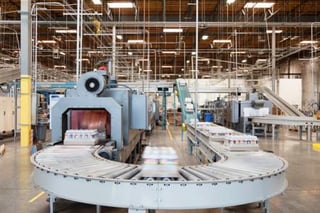
The concept of condemnation is one that comes up in a special situation for companies: Eminent domain. If your commercial property is facing eminent domain, your equipment values will be taken as part of the process. Learn what you can expect when this happens.
What Does Condemnation Mean?
When the government has evoked eminent domain for a piece of commercial property, the government assumes the responsibility to pay the private property owner for their property, which has been taken over for public usage. Eminent domain is often invoked for infrastructure improvements.
In cases of eminent domain, both the physical real estate itself and the property located onsite must be purchased from the private owner. To determine the purchase price for any equipment, the government will hire an appraiser to set machinery values. Condemnation refers to this particular process - appraising a piece of machinery for sale to the government in cases of eminent domain.
For example, assume that a state government wants to expand the railroad and add a new station. Assume that several shops are located on a given street that lies directly where the government wants to put the railroad. The state may exercise eminent domain and purchase these properties from their owners, and all real and tangible property must be appraised so that fair market value can be determined.
Why Does Condemnation Matter?
Condemnation allows the government to assess the value of a piece of equipment and pay the property's owner a fair price for the item. The owner can then take funds received and relocate their business, start a new business, or retire.
Without having a machine appraisal done, it would be difficult for the government to purchase property from the owner. A business owner, aggrieved over having to close or move their business, may fight the process of eminent domain or outright refuse to sell. This could derail the municipal project, cause expensive delays for local government while the issue is resolved legally, and also harm the business owner who may not really have the time or money to fight the issue.
The appraiser acts as a neutral third party who is only present to do a job that is in everyone's interest: Determine the value of equipment used onsite. Having an independent person who understands the value of equipment and real property can take some of the stress out of the issue, while bringing the situation to a successful and swift resolution for all parties.
Working With a Machinery Valuation Appraiser in Condemnation
Whether you are hiring an equipment appraiser in a case of eminent domain or you are selling your business and machinery, the same considerations remain. It is important to work with an appraiser who understands your industry, is familiar with the equipment used, and can articulate the reasons for valuing a piece of equipment in a given manner.
An appraiser should possess relevant certifications and deep knowledge of the particular industry, be it auto manufacturing or food service. The appraiser should use some form of fair market value to determine the value of all equipment on site. Fair market value, as we have discussed, refers to the acceptable "going rate" that a neutral third party would pay for a comparable piece of equipment on the open market. Finally, the appraiser should be able to discuss the appraisal results with government representatives and with business owners to resolve any lingering questions or concerns.

